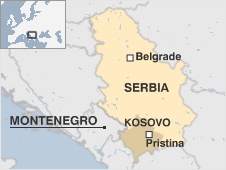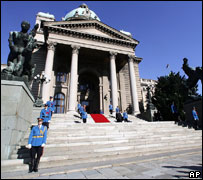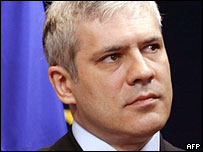Generic Medicines
Taj Pharma is the largest generic pharmaceutical company in India. We hold top positions in different established markets worldwide generics markets..
Serbia became a stand-alone sovereign republic in summer 2006 after Montenegro voted in a referendum for independence from the Union of Serbia and Montenegro.
 |
When the vote was followed by a formal declaration of independence by Montenegro a special session of parliament in Belgrade declared Serbia to be the legal successor to the now defunct union of Serbia and Montenegro.
Serbia inherits membership of the United Nations and other international institutions.

Serbia's parliament meets in central Belgrade
|
Serbia and Montenegro the two republics still left in the old Yugoslav federation had agreed in 2002 to scrap remnants of the ex-communist state and create the new looser Union of Serbia and Montenegro.
The EU-brokered deal under which the union came into being in 2003 was intended to stabilise the region by settling Montenegrin demands for independence and preventing further changes to Balkan borders.
The same agreement also contained the seeds of the Union's dissolution. It stipulated that after three years the two republics could hold referendums on whether to keep or scrap it. Montenegro duly voted for independence in a referendum in May 2006.
The two republics had been united in one form or another for nearly 90 years. With separation from Montenegro Serbia is cut off from the Adriatic Sea and becomes landlocked.
Yugoslav era
The end of the Union of Serbia and Montenegro marked the closing chapter in the history of the separation of the six republics of the old Socialist Republic of Yugoslavia which was proclaimed in 1945 and comprised Serbia Montenegro Slovenia Croatia Bosnia-Hercegovina and Macedonia.
Under Yugoslavia's authoritarian communist leader Josip Broz Tito the lid was kept on ethnic tensions. The federation lasted for over 10 years after his death in 1980 but under Serbian nationalist leader Slobodan Milosevic it fell apart through the 1990s.
The secession of Slovenia and Macedonia came relatively peacefully but there were devastating wars in Croatia and Bosnia. Serbia and Montenegro together formed the Federal Republic of Yugoslavia between 1992 and 2003.
Kosovo
In 1998 violence flared in the autonomous province of Kosovo in Serbia. The Kosovo Liberation Army supported by the majority ethnic Albanians came out in open rebellion against Serbian rule. International pressure on Milosevic grew amid the escalating violence.
Nato launched air strikes in Kosovo and Serbia in March 1999. An exodus of ethnic Albanians to neighbouring countries gathered pace. The UN took over administration of the region after Serbian forces had been driven out.
Kosovo declared independence on 17 February 2008 after the failure of UN-brokered talks on the status of the province. Serbia said the declaration was illegal and other countries are divided as to whether to recognise it.
In late 2005 the EU began talks with Belgrade on the possibility of reaching a Stabilisation and Association Agreement. These were called off some months later because of the continuing failure of the Serbian authorities to capture war crimes suspects Radovan Karadzic and Ratko Mladic.
Radovan Karadzic was arrested in Belgrade in July 2008 by Serbian security forces and extradited to The Hague weeks after a pro-Western government took office. European foreign ministers have praised the arrest as a significant step for Serbia down the road to joining the EU.
Relations with Russia
Though the current Serbian government is pro-Western and sees eventual membership of the EU as being in the country's best interests Serbia is traditionally an ally of Russia which supported its opposition to Kosovo's independence.
In 2008 Serbia-Russia ties were further strengthened by the signing of a major energy deal and in October 2009 Russia granted Serbia a 1bn euro (£0.9bn) loan to help it cover its budget deficit after the economy was hit hard by the global downturn.
President: Boris Tadic

Boris Tadic: A pro-Europe reformer
|
Boris Tadic leader of the Democratic Party (DS) first took up office in 2004. He was re-elected in 2008 once again defeating his nationalist rival Tomislav Nikolic of the Serbian Radical Party in a run-off.
Mr Tadic who took over as DS leader after the assassination of former premier Zoran Djindjic in 2003 backs free market pro-European reforms and Nato membership.
He has called on Serbs to turn their backs on the nationalism of the past and to understand that only the European route will bring lasting improvements to their lives. He has pledged full cooperation with The Hague tribunal.
He was born in 1958 and trained as a psychologist.
There is a rift between the DS and the centre-right Democratic Party of Serbia (DSS) of Prime Minister Vojislav Kostunica. Mr Kostunica formed the DS in 1989 with Zoran Djindjic.
However the party split and Mr Kostunica set up the DSS. Feuding between the DS and DSS has bedevilled Serbian politics ever since.
Prime minister: Mirko Cvetkovic

Mirko Cvetkovic rejects Kosovan independence
|
Mirko Cvetkovic was sworn in as prime minister in July 2008 after an early election in May.
The election was called after the coalition government led by Vojislav Kostunica fell apart over policy on Kosovo.
Mr Cvetkovic heads a new coalition government in which his own Democratic Party is in an unlikely alliance with erstwhile rivals in the nationalist Socialist Party as well as smaller parties representing minorities.
In his swearing-in speech Mr Cvetkovic made clear his government's rejection of Kosovan independence and said he would push for Serbia's accession to the European Union.
Mr Cvetkovic studied Economics in Belgrade and was formerly a finance minister.
The end of the Milosevic era brought new freedoms for the Serbian media and former pro-Milosevic outlets rushed to denounce the past.
RTS the national government-funded TV and radio service aims to become a public broadcaster and state-funded local and regional media outlets are set to be privatised.
Hundreds of private TV and radio stations throng the airwaves competing for a share of a small advertising market.
Hoping to bring some order Serbia's media regulator awarded national TV licences in 2006 to private operators B92 TV Pink News Corp's Fox TV TV Avala and a licence share to Kosava-Happy TV.
It granted five national radio licences - to B92 Radio Index Radio S Roadstar and Radio Focus.
In Kosovo a commission set up by the UN has set out a code of conduct for journalists which aims to prevent incitement to hatred in the media.
The public broadcaster RTK was set up as an editorially-independent service.
UN-supervised Blue Sky Radio aims to provide a multi-ethnic audience with impartial news.
The press
Television
Radio
News agencies
AFRICA | ASIA-PACIFIC | AMERICAS | EUROPE | MIDDLEEAST | SOUTHASIA
![]()
![]()
![]()
Mauritania Mauritius Morocco Mozambique Namibia Niger Nigeria Republic-of-congo Rwanda Sao-tome-and-principe Senegal Seychelles Sierra-leone Somalia South-africa Sudan Swaziland Tanzania The-gambia Togo Tunisia Uganda Australia Brunei Burma Cambodia China East-timor Fiji Indonesia Japan Kazakhstan Kiribati Kyrgyzstan Laos Malaysia Marshall-islands Micronesia Mongolia Nauru New-zealand North-korea Palau Papua-new-guinea Samoa Singapore Solomon-islands South-korea Taiwan Tajikistan Thailand The-philippines Tonga Turkmenistan Tuvalu Uzbekistan Vanuatu Vietnam Antigua-and-barbuda Belize Bolivia Brazil Canada Chile Colombia Costa-rica Cuba Dominica Dominican-republic Ecuador El-salvador Grenada Guatemala Guyana Haiti Honduras Jamaica Mexico Nicaragua St-kitts-and-nevis St-lucia Suriname Trinidad-and-tobago Uruguay Venezuela Albania Andorra Armenia Austria Azerbaijan Belarus Belgium Bosnia-hercegovina Bulgaria Croatia Cyprus Czech-republic Denmark Estonia Finland France Georgia Germany Greece Hungary Iceland Ireland Italy Latvia Liechtenstein Lithuania Luxembourg Macedonia Malta Moldova Monaco Montenegro Norway Poland Portugal Russia San-marino Serbia Slovakia Slovenia Spain Sweden Algeria Egypt Iran Iraq Israel-and-palestinian-territories Jordan Kuwait Lebanon Libya Mauritania Oman Saudi-arabia Sudan Syria Tunisia United-arab-emirates Yemen Afghanistan Bangladesh Bhutan India Nepal Pakistan Sri-Lanka The-Maldive